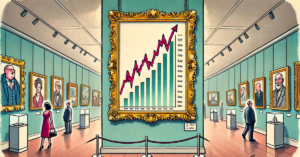Article

The FTSE 100, representing the 100 largest companies listed on the London Stock Exchange, is a crucial indicator of the UK economy’s health. However, like any stock market index, it is subject to volatility, influenced by economic cycles, political events, and global market dynamics. Investors looking to mitigate this volatility often turn to alternative assets such as art, wine, or property. These non-traditional investments can provide a hedge against market fluctuations, offering stability and potential for long-term growth.
Understanding the Volatility of the FTSE 100
The FTSE 100 is influenced by various factors, including:
1. Economic Data: Changes in GDP, inflation rates, and employment figures can impact investor sentiment.
2. Political Events: Brexit and other political developments can lead to uncertainty and market fluctuations.
3. Global Markets: International events, such as trade wars or global pandemics, can affect the index due to the global nature of the companies listed.
Why Consider Alternative Assets?
Alternative assets such as art, wine, and property have historically shown resilience during periods of stock market volatility. Here’s why they make compelling additions to an investment portfolio:
1. Diversification: Adding alternative assets can diversify a portfolio, reducing overall risk. These assets often have a low correlation with the stock market, meaning their values do not move in tandem with the FTSE 100.
2. Stability: Many alternative assets, like property and fine wine, have intrinsic value and can provide a stable investment during turbulent times.
3. Inflation Hedge: Physical assets such as real estate and collectables often appreciate in value over time, offering protection against inflation.
Incorporating Art into Your Portfolio
Investing in art can be a rewarding way to diversify. High-quality, rare pieces of art tend to appreciate over time, driven by their uniqueness and cultural significance. Here are a few tips for investing in art:
• Research and Expertise: Understand the market, artists, and trends. Consulting with art experts can provide valuable insights.
• Storage and Insurance: Proper storage and insurance are crucial to maintaining art pieces’ value.
• Liquidity: Art investments often require a longer time horizon, so be prepared for potentially lower liquidity compared to stocks.
Investing in Fine Wine
Fine wine is another alternative asset that has gained popularity among investors. The value of collectable wines from renowned vineyards tends to increase over time. Here’s how to start investing in fine wine:
• Select Reputable Wines: Focus on wines from well-known regions and vintages with proven track records.
• Storage Conditions: Proper storage is essential. Wine should be stored in a controlled environment to preserve its quality.
• Marketplaces and Funds: Consider using wine investment platforms or funds to ease the buying and selling process.
Property Investment as a Hedge
Real estate is a traditional and tangible asset class offering income and potential appreciation. Property investment can provide steady rental income and buffer against stock market volatility. Key considerations for property investment include:
• Location: Invest in areas with strong demand and potential for growth.
• Property Type: Residential, commercial, and industrial properties have different risk and return profiles.
• Management: Owning property requires active management or hiring a property management service.

Actionable Recommendations for Investing in Alternative Assets
Investing in alternative assets requires careful consideration and strategic planning. Here are some actionable recommendations to guide you:
1. Assess Your Risk Tolerance and Investment Horizon: Determine your comfortable allocation range to alternatives based on your risk tolerance and investment horizon. This helps you balance your portfolio according to your financial goals.
2. Stay Informed on Geopolitical and Economic Developments: Alternative investments can be impacted by geopolitical and economic events. Stay updated on these developments to make informed decisions.
3. Consult with Financial Advisors: Align your portfolio with current market conditions and future outlooks by consulting with financial advisors. They can provide tailored advice based on your unique financial situation.
4. Consider the Liquidity of Your Investments: Ensure you have access to capital when needed by considering the liquidity of your investments, especially in alternatives. Some alternative assets may take longer to sell and convert to cash.
Research from J.P. Morgan suggests that private bank clients typically allocate 15% to 30% of their overall portfolios to private markets. However, this is not a one-size-fits-all prescription. Investors with abundant resources and an eye toward multi-generational wealth planning may allocate upwards of 50%, underscoring a long-term commitment to the growth and stability offered by alternative investments.
Balancing Your Portfolio
While alternative assets can offer stability and diversification, it is essential to maintain a balanced portfolio. Here are some strategies:
• Allocate Wisely: Determine the percentage of your portfolio to allocate to alternative assets based on your risk tolerance and investment goals.
• Stay Informed: Keep up-to-date with market trends and developments in both the FTSE 100 and your chosen alternative asset classes.
• Regular Review: Periodically review and adjust your portfolio to ensure it aligns with your financial objectives and market conditions.
Navigating the FTSE 100 in a volatile market requires a strategic approach. By incorporating alternative assets such as art, wine, and property into your investment portfolio, you can hedge against market fluctuations and achieve greater financial stability. At De Pointe Research, we provide comprehensive insights and strategies to help you make informed investment decisions. Diversify wisely and embrace the potential of alternative assets to enhance your portfolio’s resilience.






